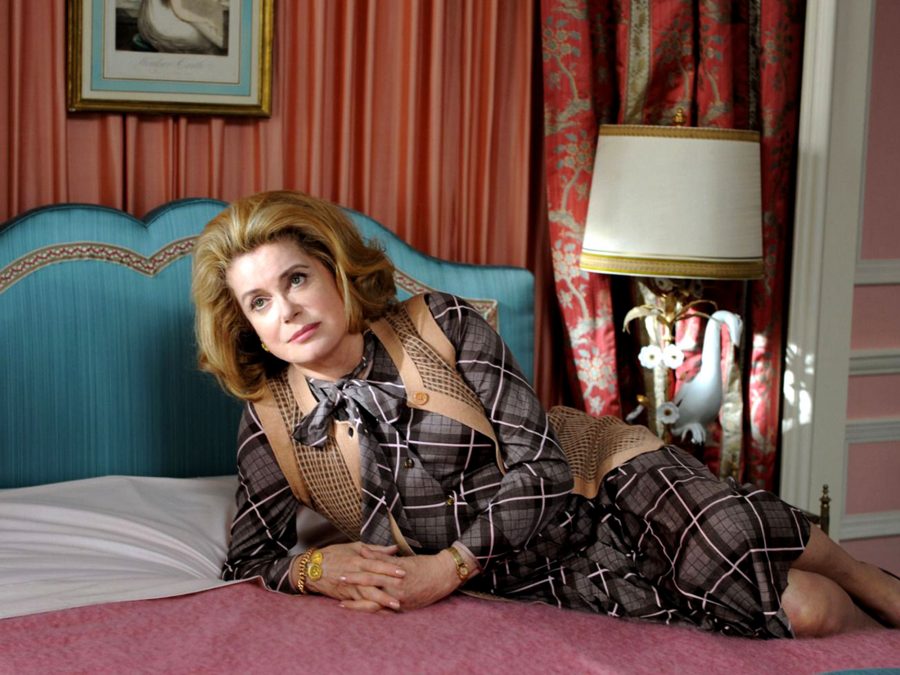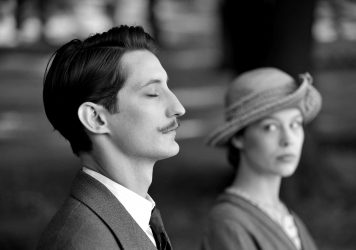
Pastel colours, fresh-faced adolescents, tanned skin and sunsets by the beach: François Ozon’s latest film Summer of 85 brings together all the elements of the 1980s French teen movie in a nostalgic, fizzy mix, by turns bitter and sweet. The film sees Alexis (Felix Lefebvre, a talent to watch) recount the dramatic story of his first love and how it led to him ending up in handcuffs, sitting outside a courthouse.
Filtered through his own subjective viewpoint – and that of Ozon himself – 1980s France appears like a place and time both idyllic and cruel, dreamlike yet at times disturbingly violent. The director takes on and shakes up the tropes of French teen movies from the era, such as 1980’s La Boum, directly referenced in the film’s lovely club scene. But Ozon being Ozon, Summer of 85 is far from a straightforward pastiche and, while lovingly referring to and borrowing from a dated type of cinema, the director inevitably imbues his depiction with his own flavour, queering it in more ways than one.
Alexis’ lover is David (Benjamin Voisin), a dashing young man slightly older than our hero, who is equipped with the confidence and easy-going attitude which the perpetually anxious and death-obsessed Alexis sorely lacks. But before our protagonist even begins to feel the first frissons of love and attraction for his new, alluring friend, the manner in which the film teases the possibility of romance feels pointedly self-aware, as if Ozon had consciously set out to take the frequent homoerotic undertones of so many teen movies from the era and bring them out into the open.
The film’s entire aesthetic, its melodramatic story of lust and rejection, and the intensity of Alexis’ voice-over as he recounts the whole tragic affair make Summer of 85 both a thrillingly sincere and poignant tale of naive adolescent love and self-discovery, and a refreshingly knowing, camp play with artifice and intertextuality.
Where to see Summer of 85But this isn’t the first time the French director has put his own reflexive spin on dusty film genres, playfully bringing out their queer potential while revisiting their respective eras and revelling in the cinematic pleasures they offer. One of his most popular films, 2002’s 8 Women, was originally imagined as a remake of George Cuckor’s 1939 film The Women, a comedy-drama featuring an all-female cast and which unveils the wheelings and dealings through which members of “the weaker sex” manage to get what they want in a world dominated by men.
Ozon’s film, based on a 1958 play by French writer Robert Thomas, treads remarkably similar territory, and while 8 Women does feature a male character, he is dead, and so much less interesting than the eight female occupants of the snowbound cottage where his apparent murder has taken place.
Set in 1950s France, the film translates the vivid technicolor of the melodramas of Douglas Sirk onto the costumes and sets themselves, exaggerating the styles of the era to the point where the outfits almost look like party costumes. This reflexivity goes hand in glove with the film’s theatricality, as well as its play with the real life personas of its cast: Danielle Darieux was a queen of actual 1950s melodramas, appearing in Max Ophüls’ La Ronde, Le Plaisir and Madame De…, while Emmanuelle Béart is an icon in her own right, a femme fatale forever remembered as the gorgeous Manon des Sources. Likewise Isabelle Huppert, the cerebral French actress par excellence, excels here in one of her earliest of many bouts of self-parody, as a neurotic woman suffering from tachycardia.

Ozon used Catherine Deneuve, the incarnation of French elegance, in another one of his playful takes on bygone film genres and eras. Potiche (2010) is a tongue-in-cheek commentary on the way charm and beauty are used to keep women in their place – be they Catherine Deneuve herself, the “potiche” or trophy wife she plays in the film, or women at large.
As the new boss of her ailing husband’s umbrella factory, Deneuve’s Suzanne Pujol is a clear reference to the actress’ role in Jacques Demy’s The Umbrellas of Cherbourg, while the cast’s outfits, hairstyles, the set design and often soft focus cinematography are so 1970s it hurts. The subtexts of sex comedies from the era is here made text by Ozon, as characters openly discuss feminism and power dynamics, while the theatricality of the mise-en-scene further brings out the film’s camp self-awareness and play with cinematic and period signifiers.
Ozon’s interest in characters – in particular women – challenging heteronormative norms took on a less flamboyant and more insidious form in a recent trio of films about unusual women who fully own their sexuality. Set in the present day, Jeune & Jolie (2013), The New Girlfriend (2014) and L’Amant Double (2017) evoke the cinematic past more through elaborate film style than period detail, borrowing their visual style from the cinema of Brian de Palma and taking the erotic thriller into a distinctly French, outrageously transgressive direction.
The director returned to the past in Frantz (2016) one of his more restrained explorations of an archaic film style. Set in the interwar period and shot in black-and-white, this somber drama borrows more straightforwardly from films of that era – unusually for Ozon, it features no sex scenes at all. In its story of a man and woman who meet through their connection to a third, dead man, the film naturally recalls Alfred Hitchcock’s Vertigo, but in its austere visual style, subtle performances and romantic momentum, it resembles more closely the war dramas of the period, from Fritz Lang, Ernst Lubitsch and Jean Renoir.
With Summer of 85 now on release and time itself appearing somewhat frozen, this might be the ideal moment to explore the cinematic worlds of Francois Ozon, consummately entertaining films which playfully dance through both cinematic and historical time.
Summer of 85 is in UK Cinemas and on Curzon Home Cinema from Friday 23 October.
Published 20 Oct 2020

By Elena Lazic
François Ozon turns back the clock for a sun-kissed gay love story that’s shot through with tragedy.

By Amy Bowker
A dour monochrome melodrama is the latest from genre-hopping French workhorse, François Ozon.